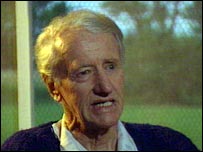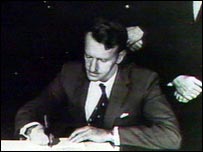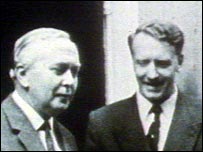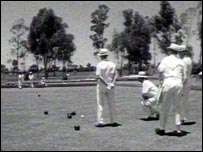MzalendoHalisi
JF-Expert Member
- Jun 24, 2007
- 4,517
- 1,367
Waziri Mkuu wa zamani wa Rhodesia- Ian Smith amefariki dunia! Hali ya Zimbabwe kwa sasa ni tete na ngumu kwa watu wengi. Je huyu Mzungu atakumbukwa Zimbabwe kwa lipi? Smith never believed Africans can rule themselves in 1000 years to come!
The former prime minister of Rhodesia, Ian Smith, has died aged 88.
The cause of his death is unknown but he had been ill for some time at a residential home in South Africa.
He illegally declared independence from Britain in 1965 and his white minority government led the country for 14 years amid international scorn and sanctions.
Following a bitter bush war with black nationalists, his government gave way to a new administration in 1979, leading to the creation of Zimbabwe.
Ian Smith's supporters continued to laud him as a political visionary and a man who understood the uncomfortable truths of Africa.
To his detractors, however, he was an unrepentant racist.
Mr Mugabe's deputy information minister, Bright Matonga, described Ian Smith as a man who brought untold suffering to millions of Zimbabweans.
"We offered him the hand of reconciliation which he never accepted. Good riddance," Mr Matonga was quoted by AFP news agency as saying.
The BBC's James Robbins says that to the end of his days Ian Smith was convinced that Rhodesians, black and white, would have fared better under his leadership than that of Robert Mugabe and his Zanu-PF party.
He died believing he had been vindicated by Zimbabwe's current crisis, with its massive inflation and unemployment.
Sidelined
Steeped in the colonial values of his Scottish immigrant father, Mr Smith was a born leader with a distinguished war record as an RAF fighter pilot, says our correspondent.
He helped to found the right-wing Rhodesian Front, which came to power in 1962, and when the-then prime minister, Winston Field, baulked at the prospect of seizing independence, the party turned to Mr Smith, who gave them what they wanted.
He became prime minister of the then self-governing British colony of Rhodesia in 1964. The following year he made his Unilateral Declaration of Independence and years of civil war ensued.
Ian Smith denied this was caused by the actions of his regime and insisted there was nothing wrong with five million blacks being ruled by 200,000 whites.
In the end, Mr Smith maintained, it was not his enemies who beat him, but apartheid South Africa's threat to cut Rhodesia's lifeline.
Margaret Thatcher's UK government brokered a peace deal in the Lancaster House talks in 1979 and a black-majority government took over Zimbabwe.
Ian Smith remained a key player in Zimbabwean politics until seats reserved for whites were abolished in 1987.
In retirement, Mr Smith was finally relegated to the sidelines.
The former prime minister of Rhodesia, Ian Smith, has died aged 88.
The cause of his death is unknown but he had been ill for some time at a residential home in South Africa.
He illegally declared independence from Britain in 1965 and his white minority government led the country for 14 years amid international scorn and sanctions.
Following a bitter bush war with black nationalists, his government gave way to a new administration in 1979, leading to the creation of Zimbabwe.
Ian Smith's supporters continued to laud him as a political visionary and a man who understood the uncomfortable truths of Africa.
To his detractors, however, he was an unrepentant racist.
Mr Mugabe's deputy information minister, Bright Matonga, described Ian Smith as a man who brought untold suffering to millions of Zimbabweans.
"We offered him the hand of reconciliation which he never accepted. Good riddance," Mr Matonga was quoted by AFP news agency as saying.
The BBC's James Robbins says that to the end of his days Ian Smith was convinced that Rhodesians, black and white, would have fared better under his leadership than that of Robert Mugabe and his Zanu-PF party.
He died believing he had been vindicated by Zimbabwe's current crisis, with its massive inflation and unemployment.
Sidelined
Steeped in the colonial values of his Scottish immigrant father, Mr Smith was a born leader with a distinguished war record as an RAF fighter pilot, says our correspondent.
He helped to found the right-wing Rhodesian Front, which came to power in 1962, and when the-then prime minister, Winston Field, baulked at the prospect of seizing independence, the party turned to Mr Smith, who gave them what they wanted.
He became prime minister of the then self-governing British colony of Rhodesia in 1964. The following year he made his Unilateral Declaration of Independence and years of civil war ensued.
Ian Smith denied this was caused by the actions of his regime and insisted there was nothing wrong with five million blacks being ruled by 200,000 whites.
In the end, Mr Smith maintained, it was not his enemies who beat him, but apartheid South Africa's threat to cut Rhodesia's lifeline.
Margaret Thatcher's UK government brokered a peace deal in the Lancaster House talks in 1979 and a black-majority government took over Zimbabwe.
Ian Smith remained a key player in Zimbabwean politics until seats reserved for whites were abolished in 1987.
In retirement, Mr Smith was finally relegated to the sidelines.




